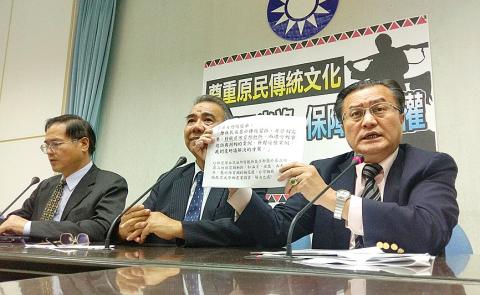The Chinese Nationalist Party (KMT) yesterday voiced its support for a Bunun hunter who was convicted on charges of poaching and illegal possession of firearms, calling on President Tsai Ing-wen (蔡英文) to respect her apology made to the nation’s Aboriginal communities, while KMT Central Policy Committee director Alex Tsai (蔡正元) called the Democratic Progressive Party (DPP) “fake Taiwanese” for persecuting Aborigines.
KMT officials and KMT Aboriginal lawmakers held separate news conferences to voice criticism of the government’s failure to live up to Tsai’s promise to safeguard Aborigines’ rights, citing the case of Bunun hunter Tama Talum, also known by his Chinese name, Wang Guang-lu (王光祿), who was found guilty of violating the Controlling Guns, Ammunition and Knives Act (槍砲彈藥刀械管制條例) and the Wildlife Conservation Act (野生動物保育法) and sentenced to three-and-a-half years in prison in October last year.
Tama and his lawyers have argued that he is entitled to hunt and practice traditional Bunun culture under the Indigenous Peoples Basic Act (原住民基本法), and Prosecutor-General Yen Ta-ho (顏大和) filed an extraordinary appeal on his behalf in December last year.

Photo: Fang Pin-chao, Taipei Times
The Supreme Court on Tuesday began to hear the appeal.
KMT caucus convener Sufin Siluko (廖國棟), an Amis, said the possession of self-made hunting rifles by Aborigines is an issue that concerns Aboriginal communities’ collective cultural rights.
The guilty verdict was based on Tama’s use of a rifle that was not of the less-sophisticated type usually used by Aborigines for hunting and ceremonies.
Aborigines cannot be asked to “use a 19th century rifle while living a modern life,” Sufin said.
KMT Legislator Yosi Takun (孔文吉), a Sediq, asked why Aborigines “are required to start fires with a bow drill when there are lighters?”
KMT Culture and Communications Committee deputy director Hu Wen-chi (胡文琦) called on the Supreme Court to be lenient in reviewing the appeal, as different sets of values might be in conflict.
KMT headquarters has asked its caucus to submit amendment proposals to ensure Aborigines’ rights, Hu said, adding that the government has only paid lip service to Aboriginal communities, as “no concrete plans or agenda have been made by the DPP central and local governments to advance Aboriginal transitional justice.”
Han Chinese immigrants and their descendants have “lived in Taiwan since the 17th century and referred to themselves as ‘Taiwanese ... [and have caused] a near extinction of wildlife,” Alex Tsai said on Facebook. “These ‘Taiwanese’ have no right to boss Aborigines around.”
“The DPP is using the law to persecute Aborigines, and these fake ‘Taiwanese’ will not be forgiven by God,” he added.

US President Donald Trump said "it’s up to" Chinese President Xi Jinping (習近平) what China does on Taiwan, but that he would be "very unhappy" with a change in the "status quo," the New York Times said in an interview published yesterday. Xi "considers it to be a part of China, and that’s up to him what he’s going to be doing," Trump told the newspaper on Wednesday. "But I’ve expressed to him that I would be very unhappy if he did that, and I don’t think he’ll do that," he added. "I hope he doesn’t do that." Trump made the comments in

Japanese footwear brand Onitsuka Tiger today issued a public apology and said it has suspended an employee amid allegations that the staff member discriminated against a Vietnamese customer at its Taipei 101 store. Posting on the social media platform Threads yesterday, a user said that an employee at the store said that “those shoes are very expensive” when her friend, who is a migrant worker from Vietnam, asked for assistance. The employee then ignored her until she asked again, to which she replied: "We don't have a size 37." The post had amassed nearly 26,000 likes and 916 comments as of this

Tourism in Kenting fell to a historic low for the second consecutive year last year, impacting hotels and other local businesses that rely on a steady stream of domestic tourists, the latest data showed. A total of 2.139 million tourists visited Kenting last year, down slightly from 2.14 million in 2024, the data showed. The number of tourists who visited the national park on the Hengchun Peninsula peaked in 2015 at 8.37 million people. That number has been below 2.2 million for two years, although there was a spike in October last year due to multiple long weekends. The occupancy rate for hotels

A cold surge advisory was today issued for 18 cities and counties across Taiwan, with temperatures of below 10°C forecast during the day and into tonight, the Central Weather Administration (CWA) said. New Taipei City, Taipei, Taoyuan and Hsinchu, Miaoli and Yilan counties are expected to experience sustained temperatures of 10°C or lower, the CWA said. Temperatures are likely to temporarily drop below 10°C in most other areas, except Taitung, Pingtung, Penghu and Lienchiang (Matsu) counties, CWA data showed. The cold weather is being caused by a strong continental cold air mass, combined with radiative cooling, a process in which heat escapes from